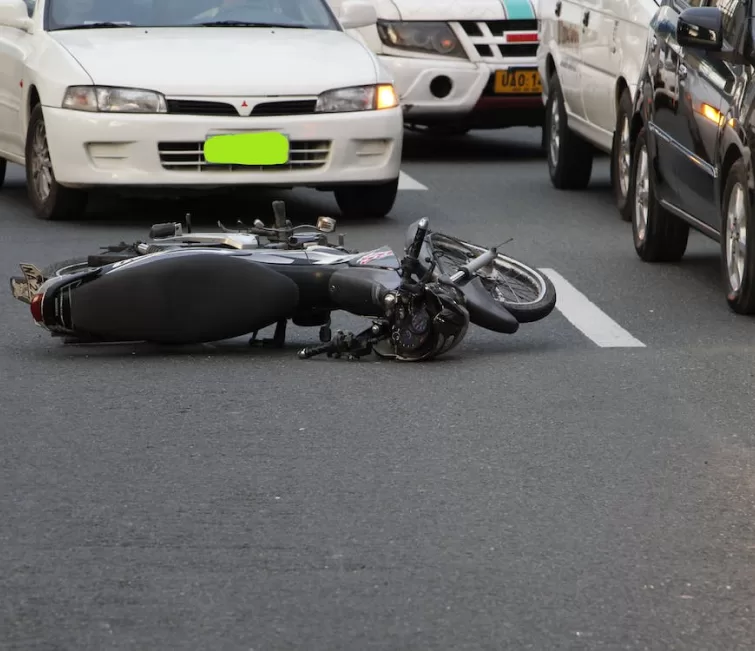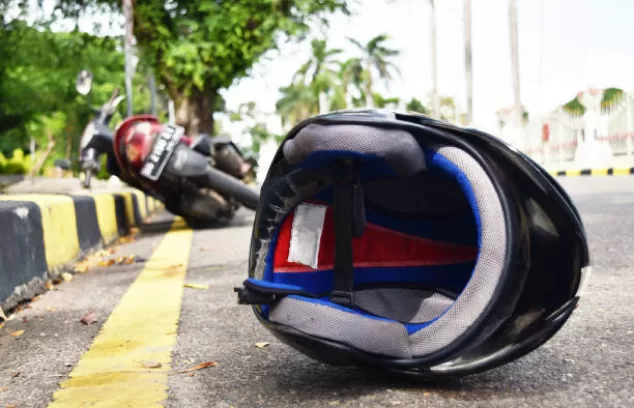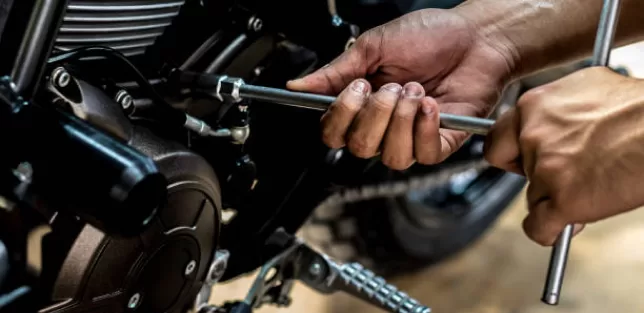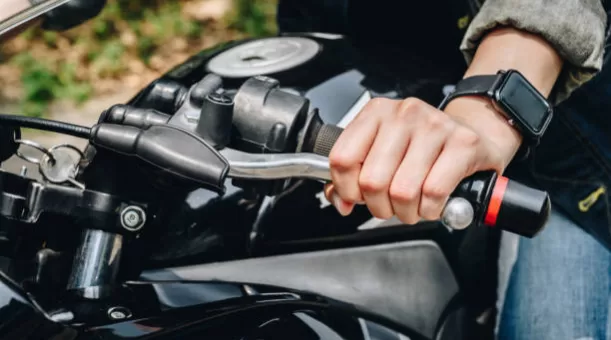Motorcycle Accident Lawyer
Imagine a clear, sunny day, perfect for a motorcycle ride along the coast. The wind is in your hair and the road is smooth and inviting. Everything is perfect until, in a split second, an unforeseen accident changes everything. You’re left with injuries, a wrecked bike, and a whirlwind of questions and concerns.
In such overwhelming situations, Accident Medical Group steps in as a beacon of support. With our extensive experience in motorcycle accident cases, our motorcycle personal injury lawyer will immediately set to work, helping you navigate through the complexities of personal injury law. Our dedicated team ensures you receive the medical attention you need, while our legal team of motorcycle accident lawyers relentlessly pursue the maximum compensation for your loss. At Accident Medical Group, motorcycle accident attorneys believe in turning the tide in your favor, transforming a moment of despair into a path toward recovery and justice.
What Floridians Should Know About Motorcycle Accident
Florida, known for its scenic coastlines and sunny weather, is a haven for motorcycle enthusiasts. However, the state’s roads also bring with them certain risks for riders. The aftermath of a motorcycle accident can be confusing, and there are several important things every Floridian should be aware of to protect their rights and ensure their recovery. Let’s delve into some crucial points you need to know if you ever find yourself involved in a motorcycle accident in the Sunshine State.

Florida's No-Fault Law Does Not Apply to Motorcyclists
In Florida, the no-fault insurance law does not cover motorcycles. This means that if you’re involved in an accident while riding, your insurance company is not automatically liable to pay for your medical expenses, unlike car insurance policies. Therefore, it becomes crucial to establish fault in a motorcycle accident to claim compensation.
Helmet Laws in Florida
Florida law allows individuals over 21 to ride a motorcycle without a helmet, provided they have at least $10,000 in medical insurance coverage. However, not wearing a helmet can lead to severe injuries in case of an accident, and it can also impact the amount of compensation you can recover.
The Importance of Immediate Medical Attention
Following a motorcycle accident, it is essential to seek immediate medical attention, even if you feel your injuries aren’t severe. Delaying medical treatment can not only escalate health risks but also weaken your claim, as insurance companies can argue that your injuries were not serious or were not a result of the accident.
The Statute of Limitations for Motorcycle Accident Claims in Florida
In Florida, the time limit to file a lawsuit for a motorcycle accident is generally four years from the date of the accident. However, certain circumstances can extend or shorten this time frame. It’s important to consult with a knowledgeable motorcycle personal injury attorney as soon as possible after an accident to ensure critical deadlines are met.
Motorcycle Accident Laws to Be Aware Of
Motorcycle laws vary by state and understanding these differences is critical for riders. Being well-versed in these laws not only helps ensure your safety but also aids in protecting your rights in the event of an accident. This section aims to shed light on some pivotal motorcycle laws that every rider should be aware of. So, let’s delve into these regulations now.
Lane Splitting Laws
In many states, lane splitting – or the ability of a motorcycle to navigate between lanes of slow-moving or stationary traffic – is a topic of debate. Currently, California is the only state that officially allows lane splitting. In contrast, Florida law prohibits this practice, citing it as dangerous and potentially leading to accidents. Riders in Florida must adhere to the same lane rules as other motorists, or risk fines and liability in the event of an accident.
Motorcycle Equipment Requirements
Florida has specific laws regarding the equipment that must be installed on motorcycles for safety purposes. For instance, all motorcycles must have working turn signals in the front and back. Riding a motorcycle at night? The law requires your motorcycle to have a powerful headlight visible from a distance of at least 300 feet in the front and a taillight visible from 1,000 feet at the back. These laws ensure that other motorists on the road can clearly see motorcycles, reducing the likelihood of accidents.
Passenger Rules on Motorcycles
In Florida, the law stipulates that motorcycles must be designed to carry more than one person if a passenger is onboard. This typically refers to the requirement for motorcycles to have permanent and regular seats, as well as footrests for the passenger. It’s illegal to carry a passenger in a manner that interferes with the motorcycle’s operation or the driver’s control.
Motorcycle Endorsement for License
To legally operate a motorcycle in Florida, drivers must have a motorcycle endorsement on their driver’s license. Before obtaining this endorsement, riders are required to complete the Basic Rider Course (BRC) from the Florida Rider Trainer Program. Failing to obtain this endorsement can result in fines and potential legal complications if involved in an accident.
By understanding and following these laws, riders can ensure not only their safety but also their legal standing in case of any unfortunate accidents.

What Happens When I'm Involved in a Motorcycle Accident?
In the unfortunate event that you find yourself involved in a motorcycle accident, there are key steps that you must take in order to protect your health, rights, and potential for compensation. This can often be a chaotic and stressful time, so understanding these steps ahead of time can be beneficial. Let’s walk through these crucial actions you should take following a motorcycle accident.

Ensure Safety and Get Out of the Way
The first thing to do after an accident is to ensure your safety and the safety of others involved. If possible, move your motorcycle out of the flow of traffic to prevent further accidents. Remember to turn on your hazard lights if they’re still operable.
Contact Law Enforcement
Next, contact law enforcement. An official police report can serve as valuable evidence when making an insurance claim or in case of a lawsuit. The police will document the accident scene and gather testimonies which can be crucial for establishing fault
Seek Medical Attention
Regardless of whether you think you’re injured or not, it’s important to seek immediate medical attention. Some injuries may not manifest immediately and could turn serious if left unchecked. Furthermore, having medical records detailing your injuries after the accident could strengthen your case should you need to pursue compensation.
Document the Scene
Take as many photos as you can at the accident scene. Cover different angles, the vehicles involved, road conditions, and any visible injuries you sustained. This step is crucial as the photos can serve as evidence.
Exchange Information
Exchange contact and insurance information with the other party involved. It’s also helpful to gather the contact information of any witnesses to the accident.
Contact Your Insurance Company
Report the accident to your insurance company as soon as possible to start the claims process. Be sure to provide them with complete and accurate information.
Consult a Motorcycle Accident Attorney
Finally, it’s highly advisable to consult with a motorcycle accident attorney. They can help you understand your rights, guide you through the claims process, and represent you should you need to take the case to court. Their experience and expertise can prove invaluable in navigating this complex situation.
I Caused a Motorcycle Accident. What Now?
If you find yourself at the heart of a situation where you are the responsible party in a motorcycle accident, it’s essential to understand the potential consequences and the steps you should take. These steps won’t just protect your rights, but they can also minimize liability and ensure a fair process. It may be a stressful situation, but knowing the appropriate actions to take can provide some semblance of control. Let’s delve into what you should do if you’ve caused a motorcycle accident.

Stay at the Scene
First and foremost, do not flee the scene.
Leaving the scene of an accident,
especially one where someone is injured, could have serious criminal implications.
Stay put and ensure the safety of all parties involved as much as possible
Document the Accident
Whether it’s a car accident, a slip and fall, or a dog bite, it’s important to report the incident to the relevant authorities.
This not only ensures that there’s an official record
of the event, but it also helps in the investigation process.
Reporting the incident promptly can strengthen
your case significantly.
Contact Law Enforcement
The next step is to contact law enforcement. They will document the scene of the accident and generate a report, which is an essential piece of evidence for insurance claims and potential court proceedings. Remember to be truthful in your interactions with law enforcement officials.
Seek Legal Advice
In extreme cases where your parents believe their case was mishandled or that their lawyer’s actions were negligent, hiring a legal malpractice lawyer may be necessary. They can assess the situation and help pursue a legal malpractice claim if appropriate.
Cooperate but Limit Communication
While it is important to cooperate with the other party involved in the accident, it is equally important to limit the amount of information you share. Do not admit fault at the scene or make statements that could be used against you later. Simply exchange contact and insurance information.
Follow Up
After the initial incident, it’s important to follow up on all your responsibilities. This could include attending court hearings, fulfilling your insurance claim obligations, and attending to any medical or legal matters that arise.
By being proactive, you can ensure a smoother process post-accident.
Contact Your Insurance Company

Steps to Take After a Motorcycle Accident
The aftermath of a motorcycle accident can be a tumultuous and distressing time. Yet, it is precisely at this time that quick thinking and a measured response are most necessary. The steps you take immediately following the incident can significantly impact your physical wellbeing, your financial responsibilities, and your legal rights. Here, we lay down a roadmap to guide you through this challenging time, ensuring you’re well-equipped to deal with any scenario that arises. Let’s embark on this journey, focusing on the critical steps to take after a motorcycle accident.

Ensure You Understand the Legal Implications
Following a motorcycle accident, it’s crucial to familiarize yourself with the relevant laws in your jurisdiction. Laws vary significantly from state to state, particularly regarding fault, insurance requirements, and compensation rights. If you’re unsure, seek legal counsel to help you understand your legal standing and potential avenues for recourse.
Maintain Regular Communication with Your Motorcycle Accident Lawyer
It is essential to maintain regular and open communication with your motorbike accident attorney if you’ve hired one. They can provide you with timely updates about your case, guide you through each step of the legal process, and help you make informed decisions. Be honest and thorough in your discussions with your motorcycle accident lawyer to ensure they have all the necessary information to represent you effectively.
Manage Your Medical Treatment
After a motorcycle accident, your health should be a priority. Follow your doctor’s advice closely and attend all your medical appointments. Keep a detailed record of your injuries, treatments, and any related expenses. This documentation can be crucial in supporting a personal injury claim.
Negotiate a Settlement
Prepare for Litigation
If a fair settlement cannot be negotiated, you may need to file a lawsuit against the at-fault party. This step involves preparing a comprehensive case, including gathering evidence, interviewing witnesses, and possibly hiring expert witnesses. Your motorcycle injury lawyer in Florida can guide you through the litigation process, ensuring your rights are defended in court.

Recovering Compensation After a Motorcycle Accident
After experiencing a motorcycle accident, one of the many challenges you’ll face is navigating the process of recovering compensation for the damages you’ve endured. This compensation, often critical in supporting your road to recovery, can cover a variety of costs, from medical bills and repair costs to compensating for lost income. This process can be complex, demanding, and at times, overwhelming. In this section, our motorcycle personal injury lawyer will explore the key steps involved in recovering compensation after a motorcycle accident, providing tips and insight to help you navigate this process with confidence.
Understand Your Insurance Policy
Before you can successfully claim compensation, it’s important to fully understand the terms of your insurance policy. This will include understanding what is covered, exclusions, your deductible, and the process for filing a claim. Contact your insurance agent if you have any questions or need clarification on your policy’s specifics.
Calculate Your Claim
Calculate the total amount of compensation you need. This should include all medical expenses, repair costs, loss of income, and non-economic damages such as pain and suffering. It’s a good idea to consult with a motorcycle accident lawyer or a financial advisor to ensure you’re not missing any potential costs.
File the Claim with Your Insurance Company
After you have calculated the compensation amount, the next step is to file the claim with your insurance company. This typically involves filling out a claim form and submitting the necessary documentation to support your claim. Ensure you provide all the necessary details and maintain a copy of all communications with your insurer.
Negotiate with the Insurance Company
Once the claim is filed, the insurance company will review it and may offer a settlement. This negotiation process may involve some back-and-forth until an agreement is reached. It’s critical to stand firm and not accept a lower settlement than what you need to cover your damages.
Appeal or Litigate If Necessary
If the insurance company denies your claim or offers a settlement that is lower than what you believe you deserve, you can appeal the decision. This can be a complex process and it’s often beneficial to have a Florida motorcycle accident lawyer help you. If the appeal is unsuccessful, you may need to take legal action against the insurance company.

Dealing with Insurance After a Motorcycle Accident
Navigating insurance claims and negotiations after a motorcycle accident can often seem like a daunting task. The process can be intricate, demanding meticulous attention to detail, persistence, and patience. However, it’s an essential step in recouping the costs of medical treatment, property damage, and other losses incurred. Understanding the nuances of your insurance policy and the claims process can be instrumental in securing a fair settlement. In the following sections, our motorcycle accident lawyers will delve into key aspects of dealing with insurance companies post-accident, shedding light on the steps you need to take to safeguard your financial interests.

Understand the Role of the Claims Adjuster
After you’ve filed your insurance claim, the insurer assigns a claims adjuster to investigate your claim. The adjuster’s role is to assess the damage, determine liability, and estimate the compensation amount. It’s important to remember that the adjuster is working in the best interest of the insurance company, so it’s crucial to provide accurate and detailed information about the accident and your damages.
Negotiating the Settlement
Once you’ve provided all the necessary information, the negotiation process begins. During this phase, the adjuster will offer a settlement amount based on their assessment. If you believe that this amount does not adequately cover your losses, do not accept it immediately. Instead, present your own calculated figures and support them with documentation. This step may involve several rounds of negotiation before a fair settlement is reached.
Consult With a Motorcycle Personal Injury Lawyer
If the negotiation process reaches a standstill or if the insurer denies your claim, it might be time to consult with a motorcycle accident claims lawyer. A legal professional, such as a motorcycle personal injury lawyer, can provide guidance, help negotiate with the insurance company, and, if necessary, represent you in court. Lawyers specializing in personal injury and insurance claims are most suitable for this role.
Taking Legal Action
If negotiations fail to result in a fair settlement, you may need to take your case to court. Your motorcycle accident lawyer will guide you through the legal process, which includes filing a lawsuit, gathering evidence, and preparing for trial. Remember, legal action should be considered as a last resort due to the time and costs involved.
Post-Settlement Steps
After reaching a settlement or receiving a court verdict, there are still a few steps to finalize the process. These may include signing release forms, paying legal fees, and receiving your compensation. Ensure you understand what’s expected of you during this phase to avoid any complications or delays in receiving your settlement.

Motorcycle Accidents Can Have Financial Consequences
Motorcycle accidents, apart from the obvious physical and emotional toll, can lead to significant financial implications. The aftermath of such incidents often involves a series of unexpected expenses including medical treatments, repairs, and replacement of damaged property, as well as potential loss of income due to incapacitation. It is crucial to understand the extensive economic impact of motorcycle accidents and be prepared for it. In the upcoming points, our motorcycle accident lawyer will delve into the financial consequences that could be faced in the aftermath of a motorcycle accident.
Medical Treatment
One of the most immediate financial consequences of a motorcycle accident is the cost of medical treatment. This could range from emergency room visits, hospitalization, surgeries, and medication, to rehabilitation services and ongoing care for severe injuries. The extent and cost of medical treatment can vary significantly depending on the severity of the injuries.
Medical Expenses
Motorcycle accidents often result in substantial damage to the motorcycle itself and possibly other personal property. The repair or replacement costs can add up quickly, especially if the motorcycle is a high-end model. Additionally, you might also be held liable for damage to other people’s property, particularly in cases where you are deemed at fault.
Property Damage
Being involved in a motorcycle accident can lead to a temporary or permanent inability to work, resulting in loss of income. This financial impact can be particularly severe if the injured party is the primary income earner for their household. Compensation for lost wages is often part of the claims process, but it can sometimes be challenging to quantify, especially for self-employed individuals or those with variable income.
Increased Insurance Premiums
Following a motorcycle accident, your insurance premiums may increase. This is especially true if you were at fault in the accident. The exact amount of the increase will depend on various factors, including your insurance company’s policies, your driving history, and the severity of the accident.
Long-term Financial Impact
The financial impact of a motorcycle accident can extend well beyond the immediate aftermath. You might face ongoing medical costs, the need for long-term care or therapy, and reduced earning capacity if you’re unable to return to your previous job. These long-term costs must be considered when calculating the overall financial impact of the accident.

How Can a Florida Motorcycle Accident Lawyer Help Me?
A motorcycle accident lawyer can be a vital ally in the aftermath of a motorcycle accident, providing much-needed guidance and support. Not only do they bring legal expertise to the table, but they also understand the nuances of motorcycle accident cases and the intricacies of dealing with insurance companies. They can help you navigate the often complex claims process, fight for fair compensation, and protect your rights every step of the way. But how exactly can they assist? Let’s delve into the specific ways a Florida motorcycle accident lawyer can help.

Case Evaluation
AMG’s team of skilled motorcycle accident lawyers begins by conducting a comprehensive case evaluation. This assessment is crucial to understand the intricacies of your case, identify liable parties, and establish the potential value of your claim.
Investigation
Our Florida motorcycle accident will carry out an in-depth investigation to gather the necessary evidence. This may include police reports, witness statements, medical receipts, and photo or video evidence. AMG’s thorough investigative approach ensures we build a strong case on your behalf.
Claim Negotiation
AMG’s legal team is experienced in the art of negotiation. Our motorcycle accident lawyers work diligently to ensure you receive the compensation you deserve, engaging in tough negotiations with insurance companies and opposing counsel.
Legal Representation in Court
In instances where a fair settlement cannot be reached outside of court, our
motorcycle accident lawyers are prepared to defend your rights within the courtroom. AMG’s motorcycle attorneys in Florida have a proven track record of successful litigation, demonstrating their commitment to achieving the best possible outcome for clients.
Post-Settlement Assistance
Even after a settlement has been reached or a verdict has been delivered, AMG will continue to support you. Our motorcycle accident lawyers provide assistance with post-settlement procedures, ensuring you understand and fulfill all necessary obligations to receive your compensation without delay.

Contact (305)-264-4357 About Your Motorcycle Accident
Don’t let the consequences of a motorcycle accident overwhelm you. Reach out to our dedicated team at (305) AMG-HELP today. Our motorcycle accident attorneys are committed to helping you navigate the challenges post-accident, and ensuring you receive the compensation you deserve. Our motorcycle personal injury lawyer will stand by your side, advocating for your rights and providing the legal expertise you need during this difficult time. Don’t wait – the path to recovery and financial stability starts with a single call.


